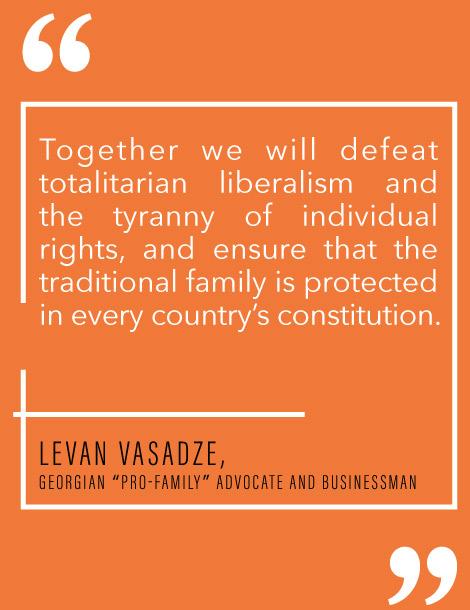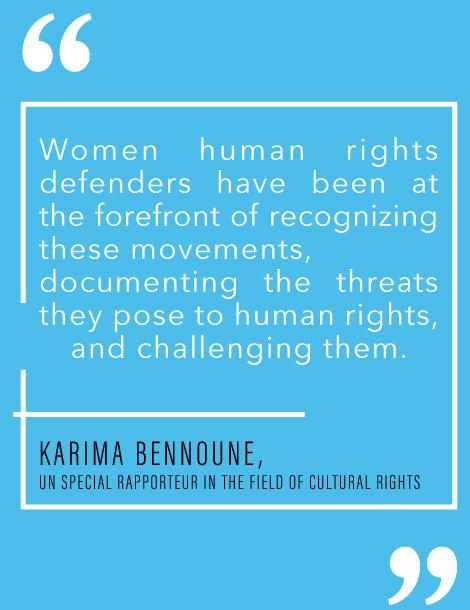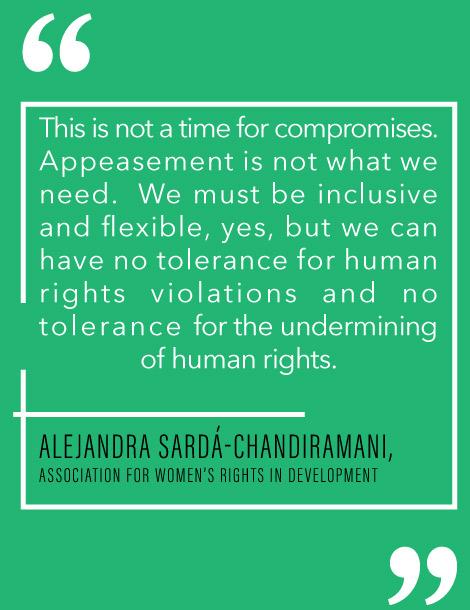On Wednesday 15th November 2017, AWID as part of the Observatory on the Universality at Rights (OURs), hosted a webinar to discuss the state of anti-rights organizing and our collective resistance, based on the findings of Rights At Risk: The OURs Trends Report 2017.
Few would now dispute that we are witnessing a rise in fundamentalisms globally. But who are these forces and how do they gain support? What do they mean for struggles for gender justice and human rights? And, perhaps most importantly, how can we collectively resist their advance?
Close to 100 activists, women human rights defenders, policy makers, and academics working across diverse fields including the law, international development, workers’ rights, sexual and reproductive rights, and sex workers’ rights, came together to discuss these questions and more. Many also shared their thoughts on Twitter using the #RightsAtRisk hashtag.
Highlights
What are we witnessing?

- Anti-rights actors are working in UN spaces to co-opt existing rights standards and push agreed language that is deeply anti-rights, towards the creation of an alternative human rights framework.
- They are creating “alternate realities”, twisting the meaning of human rights and social justice so that these themselves appear oppressive.
- They are working in at international, regional, and national levels to forward these alternative realities toward shifts in culture, policy, and law.
- They are operating in international human rights spaces with increased impact, frequency, coordination, resources and support.
- They work strategically inside and outside human rights systems - meaning they can simultaneously attack, undermine, and coopt the human rights framework towards their ends.
- They use effective communications, emotive language, and misinformation to gain support.
- They also use a range of strategies including (but not limited to) training of UN delegates, defunding and delegitimizing human rights mechanisms, and online organizing.
Cynthia Rothschild: "Universality means all human rights are for all people, no exception. Attacking this = questioning who counts as human." #rightsatrisk
— L McCormack (@lindenchariot) November 15, 2017
What is the broader context?
- The rise of fundamentalisms and fascisms is not happening in a vacuum. It is inextricably linked to growing inequalities, the rise of corporate power, conflict, displacements, colonialism, and neocolonialism.
- This is not about religion, culture, and tradition per se– all these things are plural and contested. It is the use of religion, culture, national discourse to grab social, political and economic power.
- Although counter-terrorism responses to Islamisms dominate international attention, the rise of religious fundamentalisms and fascisms is happening across all religions and regions.
- Religious and “economic fundamentalisms” sometimes go hand in hand, and severe inequalities both create and are the result of extremist systems.
- Patriarchy and misogyny are cornerstones of these ultra conservative initiatives, as are ideas of racial, ethnic, and religious superiority, including white supremacy.
Unprecedented level of engagement of anti-rights activists in intl human rights spaces - working from the inside to undermine human rights #rightsatrisk
— Chiara Capraro (@chiaracapraro) November 15, 2017
Why should we worry about what happens at the UN?

- Anti-rights actors are focusing their funds and energies on undermining multilateral spaces because they identify these as having some power to influence national policy.
- Trends at the UN are often both reflective and predictive of some of the strategies and discourses that activists will be engaging in many national contexts.
- Many of the anti-rights actors active at the UN are also big players at national levels.
- Human rights are universal: they apply to all people with no hierarchy and no exceptions. Therefore, challenges to the universality of rights are fundamentally about who is considered human.
- Attacks on the UN system and multilateralism serve ideological purposes, and women’s bodies, autonomy and sexuality are often the battlegrounds for these debates.
- The development of a parallel set of “rights” by these ultra-conservative forces doesn’t just block existing rights, it also gives increased protection to powerful institutions and governments.
- Reshaping human rights norms embeds discrimination and impunity in the international legal framework.
- Rejection and reframing of human rights standards and vilification of human rights at the national level leads to the roll-back of many kinds of legal guarantees that people rely on.
What are our ways forward?

- This is a global human rights and gender justice issue which requires a feminist and human rights response. Jointly-developed, collaborative advocacy can push back against these alarming trends, and lift up our own feminist narratives and realities into human rights spaces.
- There are many brave activists challenging fundamentalisms and fascisms all around the world: from people of many and no faith coming together to protest religious intolerance and attacks on Afro-Brazilian religions, to those resisting the appointment of anti-rights individuals to office, to high school students organizing their own sex education classes after they were removed from the curriculum, to cultural resistance like that shown by Sheema Kermani, who danced as part of the Sufi ritual dhamaal, in a shrine in Sindh, Pakistan, less than a day after it was bombed by Da’esh.
- We must stand in solidarity with these activists, WHRDs, and human rights advocates, and advocate in our own contexts.
- An intersectional understanding and approach is critical - sexual rights, economic justice, gender justice, and racial justice cannot be separated from one another.
- Defence of the universality of rights, and critique of cultural relativism is vital to respond to the trends we are witnessing. We must reclaim culture and cultural rights, and fight for women’s rights to equally access, participate in, and define culture.
- We must defend secularism and secular space (the separation of religion and the state), while recognizing a range of strategies that work both within and without religious frameworks, and which combine both.
- Our activism needs more empathy and compassion. We need to recognize the humanity in everyone - dehumanization gives permission for violence.
- The response to the rise of fundamentalisms cannot be more violence, militarization, xenophobia, bigotry and racism. We must take a stand against racisms and fundamentalisms, to break the cycle of violence.
Our speakers:
- Alejandra Sardá-Chandiramani, Association for Women’s Rights in Development
- Cynthia Rothschild, independent expert and OURs Working Group member
- Karima Bennoune, UN Special Rapporteur in the field of Cultural Rights
- Naureen Shameem, Association for Women’s Rights in Development
With an introduction from Shareen Gokal, Association for Women’s Rights in Development.
So grateful for the clarity of analysis at the #RightsAtRisk Webinar. I feel better equiped to identify who are the anti-rights groups, their means and goals, which will allow for a better, more articulate resistance.
— Ka Rodríguez (@alapuchaka) November 15, 2017
To find out more about the OURs, suggest a collaboration, or enquire about becoming an institutional member, please get in touch.
